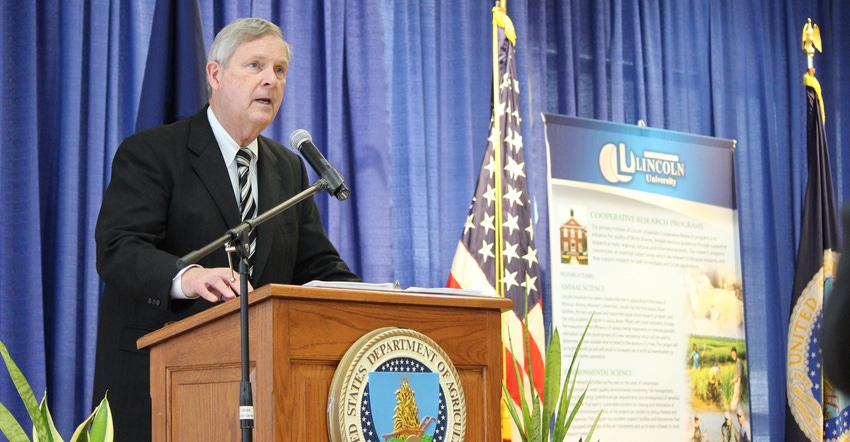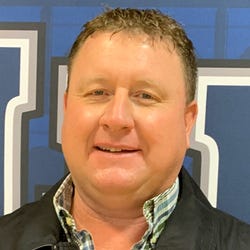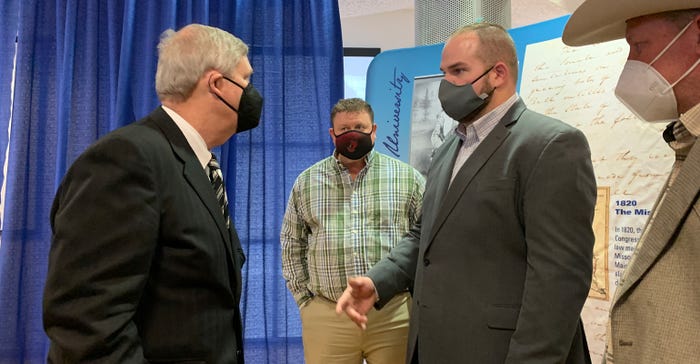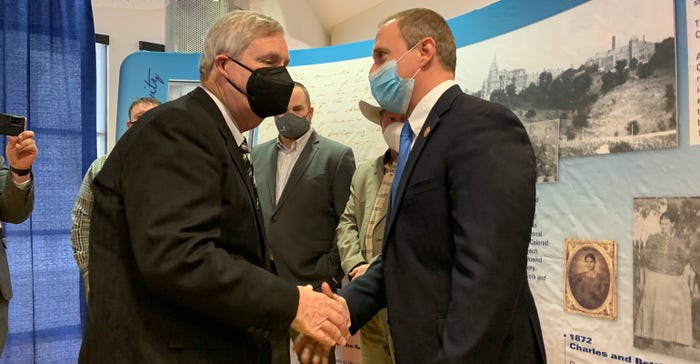
Aaron Hicks traveled roughly two hours from his corn and soybean farm in west-central Missouri to hear U.S. Secretary of Agriculture Tom Vilsack talk of a new program to advance Climate-Smart Commodities in the marketplace.
Vilsack’s first visit to Missouri since being a part of the Biden administration took him to the campus of Lincoln University in Jefferson City, where he unveiled a $1 billion commitment to Partnerships for Climate-Smart Commodities.
The funds, pulled from the Commodity Credit Corporation, will provide grants to implement pilot projects that will help incentivize farmers to:
adopt climate-smart production practices, activities and systems on working lands
measure, monitor and verify the carbon and greenhouse gas benefits associated with those practices
develop markets and promote the resulting climate-smart commodities
Related: USDA to invest $1B in establishing climate smart commodities
“The scope of the program is big,” Hicks said. “We’re talking about a billion-dollar program, so that means they’re serious about trying to implement some of these Climate-Smart Commodities ideas.”

Vilsack shared that part of his vision was the idea of a marketplace that rewards farmers who produce using climate-smart standards. He floated the idea of a “climate-smart label,” driven by the market, not USDA, to add value to agriculture commodities. “I think it would be attractive for consumers and encourage farmers to participate at the same time,” Hicks said.
The challenge, according to Hicks, is establishing a market for climate-smart crops. “Maybe this program does that.”
Common-sense conservationist
Like Hicks, Missouri Farm Bureau President Garrett Hawkins, had more questions than answers at the end of Vilsack’s visit.
“Any time a sitting U.S. secretary of agriculture visits your state, it’s a big deal,” Hicks said. “The secretary gave us a lot to think about as he talks about climate-smart agriculture and Climate-Smart Commodities.”
Hawkins sees where this type of initiative can shine a light on what farmers and ranchers across the country are already doing to mitigate climate concerns. “Missouri Farm Bureau has been very engaged in telling the story of what’s really happening in the countryside and the positive benefits that we have on the environment every day as frontline conservationists.”
However, he noted that his organization is focused on “common-sense conservation” and wanted to make sure that the type of climate-smart solutions brought forward with the initiative are beneficial to farmers and do not put additional regulatory burdens at the farm gate.
Commodity group needs science
Missouri Corn Grower CEO Bradley Schad was reassured as Vilsack stated the program is for not only new and beginning farmers, but also those who are already putting climate-smart practices to work on their farms. “This will show the benefits that corn growers are already actually implementing on their farms.”
Schad said details surrounding Climate-Smart Commodities are not finalized, but one area his organization will continue to monitor is verification of the carbon and greenhouse gas benefits associated with these practices.

ONE-ON-ONE: Missouri Corn Growers CEO Bradley Schad was able to share his organizations concerns regarding crop inputs in his conversation with U.S. Secretary of Ag Tom Vilsack.
“The biggest thing is that we’re using a science-based technology to make sure, that [for] the program, that we’re actually accounting for those correctly and making sure the farmer is getting the benefits for those,” he said. Schad added that every climate farming practice, every soil type is different. “So, it can’t be a blanket approach. We’re going to make sure that all our farmers get the maximum benefit for doing these climate-smart practices.”
How to secure funds
The goal of the Partnerships for Climate-Smart Commodities is to fund a portfolio of projects ranging from cropland, specialty crops, livestock, forestry and rangelands, according to Vilsack. “It has to be available to all producers of all sizes, all methods, all types of production,” he noted.
Vilsack said money will be provided in two funding pools, and applicants must submit their applications via grants.gov. The first funding pool for proposals is for larger proposals from $5 million to $100 million. Applications must be submitted by April 8. The second funding pool is for smaller proposals from $250,000 to $4,999,999. They will have until May 27 to apply.
In the end, Hicks, who once served on Rep. Emanuel Cleaver’s 5th Congressional District ag committee, knows this type of undertaking will take time. He likened it to the value-added ethanol industry. “It has been evolving for the last 20 years,” he added, noting it will take time to get the initiative up and working from research to production to, ultimately, market incentives.

TIME TO ENGAGE: Missouri Farm Bureau President Garrett Hawkins shares his thoughts regarding conservation and farming with Vilsack during the Feb. 8 visit to the Show-Me State.
About the Author(s)
You May Also Like






